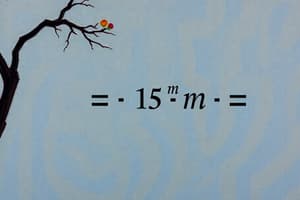Podcast
Questions and Answers
What is one primary characteristic of mental math?
What is one primary characteristic of mental math?
- Utilizes calculators for complex calculations
- Relies on written methods for solving problems
- Focuses exclusively on advanced calculus
- Involves performing arithmetic calculations in one's head (correct)
Which strategy is useful for simplifying addition when applying mental math?
Which strategy is useful for simplifying addition when applying mental math?
- Using the 'make ten' strategy (correct)
- Multiplying both numbers by two
- Subtracting one number from the other
- Dividing the first number by the second
Which technique involves rounding numbers to simplify calculations in mental math?
Which technique involves rounding numbers to simplify calculations in mental math?
- Doubling and halving
- Breaking down numbers
- Using patterns
- Rounding to the nearest benchmark (correct)
What advantage does mental math provide in everyday situations?
What advantage does mental math provide in everyday situations?
In mental math, what is the purpose of manipulating numbers, such as adjusting them for easier calculations?
In mental math, what is the purpose of manipulating numbers, such as adjusting them for easier calculations?
What is a common challenge faced when performing mental math?
What is a common challenge faced when performing mental math?
Which technique can be applied for multiplying two numbers to make the computation easier?
Which technique can be applied for multiplying two numbers to make the computation easier?
Which of the following is a recommended practice for improving mental math skills?
Which of the following is a recommended practice for improving mental math skills?
Study Notes
Definition of Mental Math
- Mental math refers to performing arithmetic calculations in one's head without the use of calculators or paper.
- It involves using number sense and strategies to solve problems quickly and efficiently.
Benefits of Mental Math
- Enhances numerical fluency and confidence.
- Improves problem-solving skills and cognitive abilities.
- Encourages estimation and approximation skills.
- Useful for everyday situations (e.g., shopping, budgeting).
Key Strategies for Mental Math
-
Breaking Down Numbers
- Decompose numbers into easier components (e.g., 27 + 38 becomes 20 + 30 + 7 + 8).
-
Using Benchmarks
- Round numbers to the nearest ten, hundred, etc., to simplify calculations (e.g., 49 can be rounded to 50 for easier addition).
-
Using Patterns
- Recognize patterns in numbers (e.g., multiplying by 9 can be done by multiplying by 10 and subtracting the original number).
-
Estimation
- Make educated guesses to quickly arrive at a rough answer (e.g., estimating 398 + 275 as 400 + 300).
-
Manipulating Numbers
- Adjust numbers for easier calculations (e.g., for 48 x 5, think of it as (50 x 5) - (2 x 5)).
Common Mental Math Techniques
-
Addition and Subtraction
- Use the "make ten" strategy for addition (e.g., 8 + 6 = 8 + 2 + 4 = 10 + 4 = 14).
-
Multiplication and Division
- Use the distributive property (e.g., for 7 x 6, think of it as 7 x (5 + 1) = 35 + 7 = 42).
-
Doubling and Halving
- Double one number and halve the other for easier multiplication (e.g., 16 x 25 can be calculated as 8 x 50).
Practice Techniques
- Regularly practice calculations without aids.
- Use flashcards for quick recall of basic facts.
- Engage in mental math games or apps that encourage skill improvement.
Common Challenges
- Anxiety or pressure during calculations can hinder performance.
- Complexity of numbers may increase difficulty; start with simpler problems.
- Requires consistent practice to build speed and accuracy.
Tips for Improvement
- Set aside time each day to practice mental math.
- Focus on one specific operation at a time (addition, subtraction, etc.).
- Challenge yourself with real-life scenarios to apply mental math.
Definition of Mental Math
- Mental math is performing arithmetic calculations in the mind without external aids like calculators or paper.
- It relies on number sense and various strategies for rapid and efficient problem-solving.
Benefits of Mental Math
- Boosts numerical fluency, enhancing confidence in math skills.
- Facilitates better problem-solving abilities and overall cognitive functions.
- Fosters skills in estimation and approximation, which are useful in daily life.
- Applies to practical situations such as budgeting and shopping.
Key Strategies for Mental Math
- Breaking Down Numbers: Decompose complex numbers into manageable components for easier calculation.
- Using Benchmarks: Round numbers to nearest multiples (e.g., 49 to 50) for simplified arithmetic.
- Using Patterns: Identify predictable patterns (e.g., using multiplication tricks) to streamline calculations.
- Estimation: Generate reasonable approximations quickly, aiding in swift evaluations.
- Manipulating Numbers: Alter values for easier operations; for example, adjusting terms in multiplication.
Common Mental Math Techniques
- Addition and Subtraction: Use the "make ten" strategy to facilitate addition; combines numbers to simplify.
- Multiplication and Division: Apply the distributive property for easier calculations, breaking down products into simpler sums.
- Doubling and Halving: Transform multiplication by doubling one number while halving another for efficiency.
Practice Techniques
- Engage consistently in calculations without the use of aids to strengthen mental math skills.
- Utilize flashcards for rapid recall of fundamental arithmetic facts.
- Participate in mental math games or applications designed to enhance quick thinking.
Common Challenges
- Anxiety or pressure can impede performance during calculations, affecting accuracy.
- Increasing complexity in numbers can present difficulties; start with simpler problems.
- Achieving speed and precision demands regular and persistent practice.
Tips for Improvement
- Dedicate daily time for mental math practice to enhance competence.
- Concentrate on mastering one mathematical operation at a time for focused learning.
- Create real-life scenarios or challenges to apply mental math, reinforcing practical application.
Studying That Suits You
Use AI to generate personalized quizzes and flashcards to suit your learning preferences.
Description
This quiz explores the definition, benefits, and key strategies of mental math. Participants will learn how to perform arithmetic calculations mentally, improve their numerical fluency, and apply useful strategies in everyday situations. Test your knowledge and enhance your cognitive skills through mental math.




